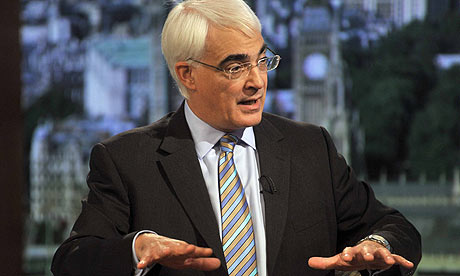Public finances much worse than feared
The recession has hit tax receipts hard while government spending on unemployment and other social benefits has risen
- guardian.co.uk, Thursday 20 August 2009 12.30 BST
- Article history

The Treasury said the deterioration had been anticipated in Alistair Darling's April budget. Photograph: Jeff Overs/BBC /Getty Images
Britain's public finances plunged far deeper into the red last month than the City expected, recording a record July deficit of £8bn as tax receipts slumped.
This was the biggest July shortfall since records began in 1993 in a month that traditionally records a surplus.
Public-sector net borrowing was £8.016bn – much worse than analysts' forecasts of a £500m shortfall and the first time the government finances have been in the red in July since 1996. This was in sharp contrast to the surplus of £5.2bn a year earlier, the Office for National Statistics said.
July is usually a "fat month" for tax receipts, economists said, but not this time as public coffers received some £3.75bn less than last year in tax income from recession-hit companies. At the same time, the economic downturn has led to higher government spending on unemployment and other social benefits.
Analysts said the figures confirmed that the public finances are in a "dire state". Colin Ellis at Daiwa Securities said: "The authorities must be hoping that quantitative easing starts working soon, as the only extra support that is at all likely from fiscal policy over the next year is probably an extension of the VAT cut and/or the modest car scrappage scheme.
"But given the underlying weaknesses that are evident into today's data, if the economy remains weak then the toll on the public sector finances could end up being truly horrible."
Vicky Redwood at Capital Economics noted that "the necessary fiscal consolidation is going to be a huge constraint on the economic recovery".
Total central government receipts fell to £44.1bn last month from £52bn a year earlier. Corporate tax income declined by 38% – the biggest drop since records began in 1998 – and proceeds from income and wealth taxes were down 22%. This was compounded by a rise in government expenditure to £46.7bn from £43.4bn, with spending on social benefits climbing to £14bn from £12.7bn.
"The public finances data were far worse than expected," said Peter Dixon at Commerzbank. "Tax revenues have clearly collapsed."
It is the third time this week that City economists have been caught on the hop after Tuesday's higher-than-expected inflation figures and news that Bank of England governor Mervyn King and two others wanted to pump an extra £75bn into the economy this month – but were outvoted by the rest of the monetary policy committee who sanctioned a £50bn stimulus.
Analysts now fear that Alistair Darling's prediction of a record £175bn deficit this fiscal year is too conservative. Stephen Lewis, at Monument Securities said: "Very disappointing figure on public sector finances. It indicates that the downturn in the economy is making deep inroads into tax receipts and that we may well end the year with an even larger deficit than was projected in the Budget."
In the financial year so far, borrowing has risen to £49.8bn – more than three times the £15.9bn in the same period last year. Central government receipts haven fallen by 12% since April while spending has grown by 6.2%.
Richard Snook at the Centre for Economics and Business Research predicts that government borrowing will come close to £200bn this year, "giving which ever government takes power in 2010 a once-in-a-generation challenge to bring the debt and deficit back down to manageable levels".
Britain's net debt shot up £800.8bn, today's figures showed – equivalent to 56.8% of gross domestic product, up from 43.5% a year ago.
The Treasury said the deterioration in the public finances was the result of the deep economic downturn earlier in the year and had been anticipated in the chancellor's April budget.

No comments:
Post a Comment